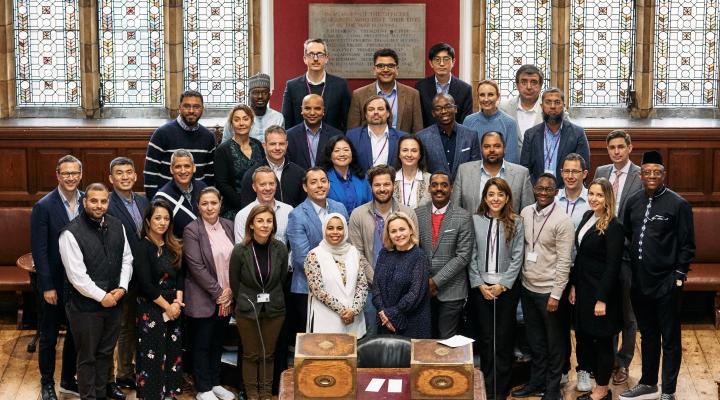After almost 20 years working in the banking industry, including for household names such as Deutsche Bank and Citi Group, I had a sudden realisation: my work had become quite operational.
Initially, I couldn’t pinpoint why I felt this way. It wasn’t that I was stagnating, in fact, I had enjoyed a really successful banking career and at the time I had an active role as CFO of the Addiko Bank in Croatia. But what I felt I was missing, was the opportunity to step back from my day-to-day tasks, reflect on my experiences, and refresh my approach.
I already had an academic background in Finance, having studied an Executive MBA in New York focused on financial management, and I found this to be a useful opportunity to revitalise, rethink certain approaches and challenge myself again. But this time around it wasn’t an option for me to take a career break for a year – particularly given my role and that, as a banking group, we were beginning the IPO planning process. Equally, as I had already completed various finance training programmes, I was looking for a way to reflect and engage with the topics on a much deeper, more advanced level.
This is where the Diploma in Financial Strategy came in. The part-time structure of the programme provided the balance I was looking for, and the course content offered a rich and unusual combination of both finance and strategy topics. It was a perfect match and I quickly decided to join the programme in 2019.
Joining the programme as a CFO, I wasn’t quite sure how I would compare to my fellow peers’ experiences. Would I fit in? What new experiences could I learn from?
As I entered the classroom on the first day of the first module, I was struck by just how diverse the programme cohort was. My peers were from over 35 different nationalities, the majority with extensive financial knowledge and others with significant experience on the strategy side. It really was a truly diverse, worldwide network.
The programme format was lively and engaging and the professors were highly experienced at drawing out relevant insights from each of our backgrounds for the wider class to learn from. The interweaving of theories, contemporary case studies and practical frameworks with a critical exchange of views, was a priceless experience.
Regardless of whether you had a background in Finance or Strategy, everyone could benefit from the Diploma in many ways. For me personally, it helped to advance my finance knowledge and strategic toolkit to a specialised level, improve my critical viewpoint so that I can better assess the efficacy of our work, and think outside the box.
When it came to my Final Integrative Assignment (FIA), I decided to focus on a specific company challenge that we had to tackle. At the time, we were owned by a private equity firm and on the road to an IPO, so we weren’t a traditional bank as such. The challenge we had was that we were looking at how we could completely rethink our corporate strategy to become a modern, digital consumer bank, and the risks of not doing so were equally great. As I was part of the senior team, I was going to be part of the group that would perform a complete strategic assessment to understand what the ultimate impact would be on the bank’s bottom line as a result of a successful IPO. I knew I was going to have to tackle this challenge head-on at some point and we had six months to reach our final decision, so why not start some of my thinking now as part of the Diploma?
At the time, I had no idea how powerful it would be to make this the focus of my FIA. Firstly, I was able to take the opportunity to spend more time on the project. From the start, I was able to approach it from a much more independent, objective and ‘consultant-style’ viewpoint than I ever could in my day job as CFO. It meant that I had the permission to ask more challenging questions, and the freedom and creativity to explore the answers. In doing so, I was able to analyse the problem from all possible angles and to a greater depth than ever before.
Secondly, I had the support of my peers behind me. How often can you say that you’ve been able to draw on the advice, opinions, and recommendations of a classroom of consultants to help solve your biggest challenge? Being able to reach out to my peers who all bring such different and rich experience to the table was so valuable.
In the end, the FIA in particular helped me tremendously. I was able to reach a conclusion and make a thoughtful decision, based on research, empirical evidence, arguments presented and quantitative result derived from academically accepted valuation frameworks which would impact the future of our company. It made me feel completely assured of my standpoint and it became much easier to present my thinking and get the buy-in from key stakeholders.
But my story doesn’t end there. After completing the programme in 2020, I was delighted to hear that my FIA had been awarded The Worshipful Company of International Bankers’ (WCIB) Prize! I was so honoured – it was truly a great ending to an amazing experience at Saïd Business School.
If you’re reading my story and thinking about applying to Oxford – do it! Stay focused on your studies and maximise the time you have at the School. Come as prepared as you can to get the most out of the wonderful professors and your fellow cohort colleagues. I was blessed to meet so many brilliant and amazing peers during my studies. Now, whichever continent I travel to, I know that I can ring someone who is based there for professional advice, personal support or just to catch up over coffee. And it’s for that reason that you just know these relationships will last a lifetime.
Prize winner
‘We are pleased to announce that Josko has won the WCIB prize for the best Final Integrative Assignment paper in our 2019 cohort. We would like to take this opportunity to congratulate Josko on being selected for this award among other recipients from a range of leading business schools.' Ken Okamura, Diploma in Financial Strategy Academic Director.





